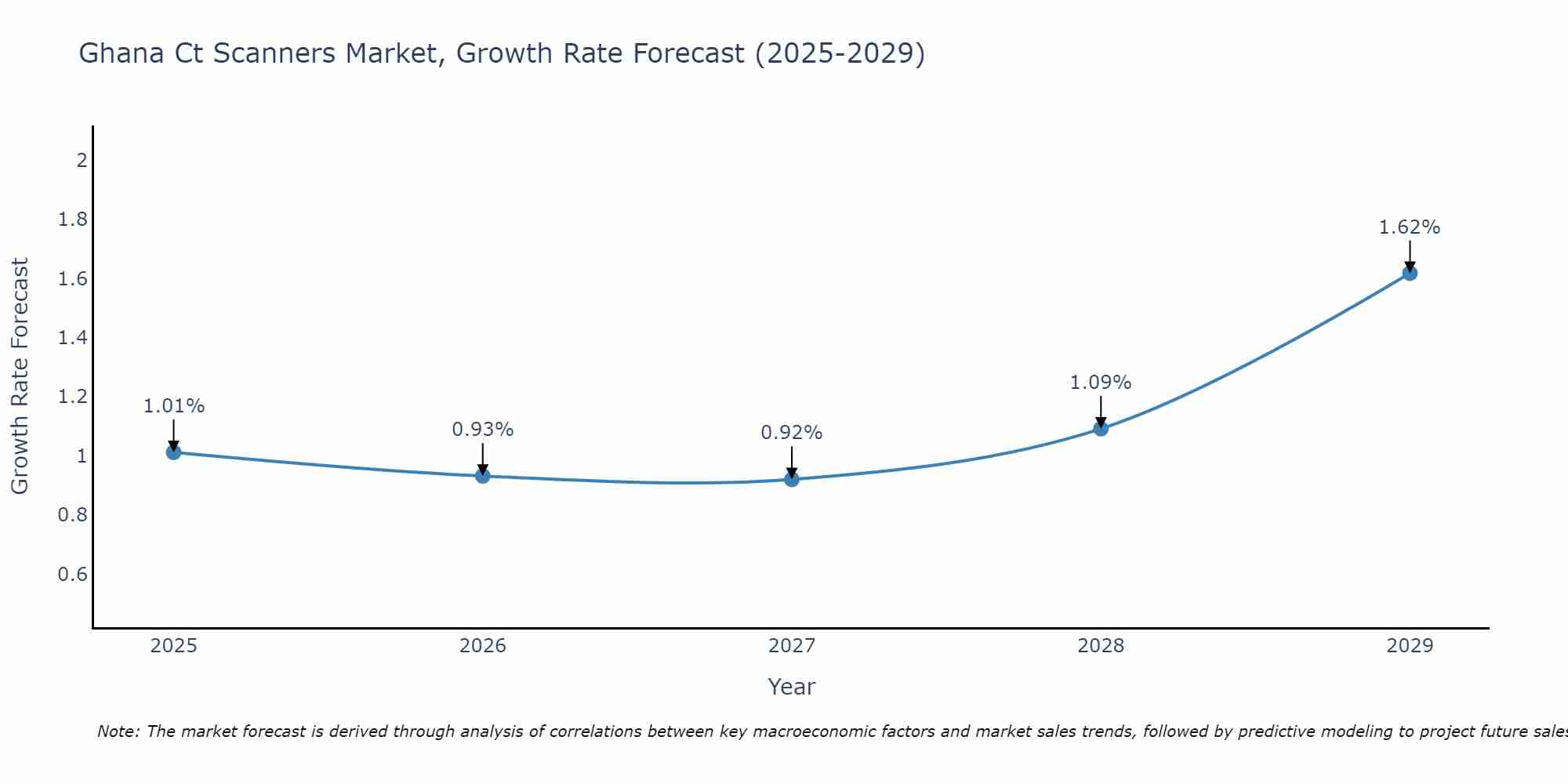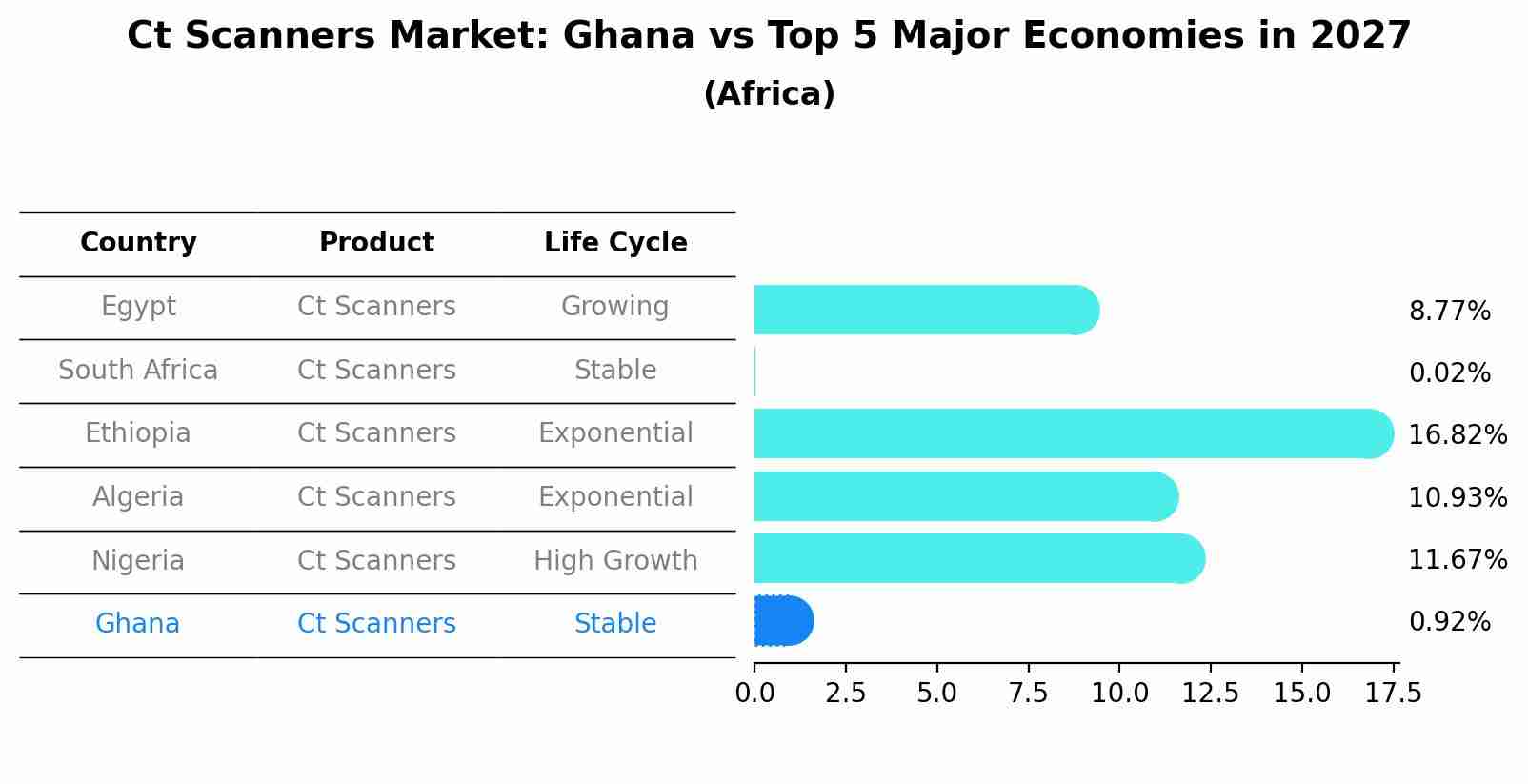Ghana Ct Scanners Market (2025-2031) Outlook | Forecast, Share, Value, Trends, Industry, Companies, Analysis, Revenue, Growth & Size
| Product Code: ETC362816 | Publication Date: Aug 2022 | Updated Date: Aug 2025 | Product Type: Market Research Report | |
| Publisher: 6Wresearch | Author: Shubham Padhi | No. of Pages: 75 | No. of Figures: 35 | No. of Tables: 20 |
Ghana Ct Scanners Market Size Growth Rate
The Ghana Ct Scanners Market is projected to witness mixed growth rate patterns during 2025 to 2029. The growth rate starts at 1.01% in 2025 and reaches 1.62% by 2029.

Ct Scanners Market: Ghana vs Top 5 Major Economies in 2027 (Africa)
By 2027, Ghana's Ct Scanners market is forecasted to achieve a stable growth rate of 0.92%, with Egypt leading the Africa region, followed by South Africa, Ethiopia, Algeria and Nigeria.

Ghana Ct Scanners Market Synopsis
The Ghana CT scanners market is experiencing steady growth driven by increasing healthcare infrastructure development, rising prevalence of chronic diseases, and growing demand for advanced diagnostic imaging technologies. Key market players are expanding their presence in the country through strategic partnerships with local hospitals and healthcare providers. The market is characterized by a mix of global and local manufacturers offering a range of CT scanner products to cater to the diverse needs of healthcare facilities. Government initiatives to improve healthcare services, along with a growing focus on early disease detection and treatment, are expected to further boost the demand for CT scanners in Ghana. However, challenges such as high equipment costs and limited access to advanced healthcare facilities in rural areas could hinder market growth.
Ghana Ct Scanners Market Trends
Currently, the Ghana CT scanners market is experiencing a growing demand for advanced imaging technology to improve diagnostic capabilities and patient outcomes. There is a trend towards the adoption of more compact and portable CT scanners, especially in rural or underserved areas where access to healthcare facilities is limited. Additionally, there is an increasing focus on integrating artificial intelligence and machine learning algorithms into CT scanners to enhance image quality, reduce radiation exposure, and streamline workflow efficiency. The market is also witnessing a rise in public-private partnerships and collaborations to expand access to CT scanning services across different regions in Ghana. Overall, the trend in the Ghana CT scanners market is towards innovation, accessibility, and improved patient care.
Ghana Ct Scanners Market Challenges
In the Ghana CT scanners market, some of the challenges faced include high initial setup costs, limited access to advanced technology and equipment, inadequate infrastructure in certain regions leading to uneven distribution of services, and a shortage of skilled professionals to operate and maintain the equipment. Additionally, the high cost of maintenance and repairs, as well as the lack of insurance coverage for expensive diagnostic procedures, can pose barriers to widespread adoption of CT scanners in the country. Regulatory hurdles and import restrictions on medical equipment also contribute to the challenges faced by providers and healthcare facilities in expanding and upgrading their CT scanning capabilities in Ghana. Addressing these challenges will be crucial in improving healthcare outcomes and access to advanced diagnostic services in the country.
Ghana Ct Scanners Market Investment Opportunities
In the Ghana CT scanners market, there are opportunities for investment in the expansion of healthcare facilities and the adoption of advanced medical technologies. The increasing demand for diagnostic imaging services, driven by a growing population and rising incidence of chronic diseases, presents a favorable environment for the deployment of CT scanners. Investing in the distribution and servicing of CT scanners can be lucrative, as healthcare providers seek to enhance their diagnostic capabilities and improve patient care. Additionally, partnerships with local hospitals and government initiatives to improve healthcare infrastructure can offer avenues for investment in this market. Overall, the Ghana CT scanners market presents opportunities for investors to contribute to the advancement of healthcare services in the country while potentially realizing substantial returns on their investments.
Jordan Agar Market Government Policies
In Ghana, the government has implemented various policies related to the importation and use of CT scanners. The Ghana Food and Drugs Authority (FDA) regulates the registration and importation of medical devices, including CT scanners, to ensure quality and safety standards are met. Additionally, the government has established guidelines for the maintenance and servicing of medical equipment, including CT scanners, to ensure optimal performance and longevity. The Ministry of Health collaborates with stakeholders to develop policies aimed at expanding access to advanced medical imaging technologies, such as CT scanners, particularly in underserved areas. Overall, the government`s policies in Ghana aim to promote the quality, accessibility, and efficiency of CT scanning services in the country.
Ghana Ct Scanners Market Future Outlook
The future outlook for the Ghana CT Scanners market appears promising, driven by factors such as increasing healthcare infrastructure development, rising prevalence of chronic diseases, and growing government initiatives to improve healthcare services. The demand for advanced imaging technologies like CT scanners is expected to rise as healthcare facilities strive to enhance diagnostic accuracy and efficiency. Additionally, the increasing focus on early disease detection and treatment is likely to fuel the adoption of CT scanners in Ghana. However, challenges such as high initial costs, limited technical expertise, and infrastructure constraints may hinder market growth to some extent. Overall, with ongoing technological advancements and increasing healthcare investments, the Ghana CT Scanners market is anticipated to witness steady growth in the coming years.
Key Highlights of the Report:
- Ghana Ct Scanners Market Outlook
- Market Size of Ghana Ct Scanners Market, 2024
- Forecast of Ghana Ct Scanners Market, 2031
- Historical Data and Forecast of Ghana Ct Scanners Revenues & Volume for the Period 2021 - 2031
- Ghana Ct Scanners Market Trend Evolution
- Ghana Ct Scanners Market Drivers and Challenges
- Ghana Ct Scanners Price Trends
- Ghana Ct Scanners Porter's Five Forces
- Ghana Ct Scanners Industry Life Cycle
- Historical Data and Forecast of Ghana Ct Scanners Market Revenues & Volume By Type for the Period 2021 - 2031
- Historical Data and Forecast of Ghana Ct Scanners Market Revenues & Volume By Stationary CT scanners for the Period 2021 - 2031
- Historical Data and Forecast of Ghana Ct Scanners Market Revenues & Volume By Portable CT scanners for the Period 2021 - 2031
- Historical Data and Forecast of Ghana Ct Scanners Market Revenues & Volume By Device Architecture for the Period 2021 - 2031
- Historical Data and Forecast of Ghana Ct Scanners Market Revenues & Volume By C-arm CT Scanners for the Period 2021 - 2031
- Historical Data and Forecast of Ghana Ct Scanners Market Revenues & Volume By O-arm CT Scanners for the Period 2021 - 2031
- Historical Data and Forecast of Ghana Ct Scanners Market Revenues & Volume By Technology for the Period 2021 - 2031
- Historical Data and Forecast of Ghana Ct Scanners Market Revenues & Volume By High-slice CT for the Period 2021 - 2031
- Historical Data and Forecast of Ghana Ct Scanners Market Revenues & Volume By Mid-slice CT for the Period 2021 - 2031
- Historical Data and Forecast of Ghana Ct Scanners Market Revenues & Volume By Low-slice CT for the Period 2021 - 2031
- Historical Data and Forecast of Ghana Ct Scanners Market Revenues & Volume By Cone-beam CT for the Period 2021 - 2031
- Historical Data and Forecast of Ghana Ct Scanners Market Revenues & Volume By Application for the Period 2021 - 2031
- Historical Data and Forecast of Ghana Ct Scanners Market Revenues & Volume By Human Application for the Period 2021 - 2031
- Historical Data and Forecast of Ghana Ct Scanners Market Revenues & Volume By Diagnostic Applications for the Period 2021 - 2031
- Historical Data and Forecast of Ghana Ct Scanners Market Revenues & Volume By Cardiology Applications for the Period 2021 - 2031
- Historical Data and Forecast of Ghana Ct Scanners Market Revenues & Volume By Oncology Applications for the Period 2021 - 2031
- Historical Data and Forecast of Ghana Ct Scanners Market Revenues & Volume By Neurology Applications for the Period 2021 - 2031
- Historical Data and Forecast of Ghana Ct Scanners Market Revenues & Volume By Intraoperative Applications for the Period 2021 - 2031
- Historical Data and Forecast of Ghana Ct Scanners Market Revenues & Volume By Veterinary Application for the Period 2021 - 2031
- Historical Data and Forecast of Ghana Ct Scanners Market Revenues & Volume By Research Application for the Period 2021 - 2031
- Ghana Ct Scanners Import Export Trade Statistics
- Market Opportunity Assessment By Type
- Market Opportunity Assessment By Device Architecture
- Market Opportunity Assessment By Technology
- Market Opportunity Assessment By Application
- Ghana Ct Scanners Top Companies Market Share
- Ghana Ct Scanners Competitive Benchmarking By Technical and Operational Parameters
- Ghana Ct Scanners Company Profiles
- Ghana Ct Scanners Key Strategic Recommendations
Frequently Asked Questions About the Market Study (FAQs):
- Single User License$ 1,995
- Department License$ 2,400
- Site License$ 3,120
- Global License$ 3,795
Search
Thought Leadership and Analyst Meet
Our Clients
Related Reports
- Germany Breakfast Food Market (2026-2032) | Industry, Share, Growth, Size, Companies, Value, Analysis, Revenue, Trends, Forecast & Outlook
- Australia Briquette Market (2025-2031) | Growth, Size, Revenue, Forecast, Analysis, Trends, Value, Share, Industry & Companies
- Vietnam System Integrator Market (2025-2031) | Size, Companies, Analysis, Industry, Value, Forecast, Growth, Trends, Revenue & Share
- ASEAN and Thailand Brain Health Supplements Market (2025-2031) | Strategy, Consumer Insights, Analysis, Investment Trends, Opportunities, Growth, Size, Share, Industry, Revenue, Segments, Value, Segmentation, Supply, Forecast, Restraints, Outlook, Competition, Drivers, Trends, Demand, Pricing Analysis, Competitive, Strategic Insights, Companies, Challenges
- ASEAN Bearings Market (2025-2031) | Strategy, Consumer Insights, Analysis, Investment Trends, Opportunities, Growth, Size, Share, Industry, Revenue, Segments, Value, Segmentation, Supply, Forecast, Restraints, Outlook, Competition, Drivers, Trends, Demand, Pricing Analysis, Competitive, Strategic Insights, Companies, Challenges
- Europe Flooring Market (2025-2031) | Outlook, Share, Industry, Trends, Forecast, Companies, Revenue, Size, Analysis, Growth & Value
- Saudi Arabia Manlift Market (2025-2031) | Outlook, Size, Growth, Trends, Companies, Industry, Revenue, Value, Share, Forecast & Analysis
- Uganda Excavator, Crane, and Wheel Loaders Market (2025-2031) | Strategy, Consumer Insights, Analysis, Investment Trends, Opportunities, Growth, Size, Share, Industry, Revenue, Segments, Value, Segmentation, Supply, Forecast, Restraints, Outlook, Competition, Drivers, Trends, Demand, Pricing Analysis, Competitive, Strategic Insights, Companies, Challenges
- Rwanda Excavator, Crane, and Wheel Loaders Market (2025-2031) | Strategy, Consumer Insights, Analysis, Investment Trends, Opportunities, Growth, Size, Share, Industry, Revenue, Segments, Value, Segmentation, Supply, Forecast, Restraints, Outlook, Competition, Drivers, Trends, Demand, Pricing Analysis, Competitive, Strategic Insights, Companies, Challenges
- Kenya Excavator, Crane, and Wheel Loaders Market (2025-2031) | Strategy, Consumer Insights, Analysis, Investment Trends, Opportunities, Growth, Size, Share, Industry, Revenue, Segments, Value, Segmentation, Supply, Forecast, Restraints, Outlook, Competition, Drivers, Trends, Demand, Pricing Analysis, Competitive, Strategic Insights, Companies, Challenges
Industry Events and Analyst Meet
Whitepaper
- Middle East & Africa Commercial Security Market Click here to view more.
- Middle East & Africa Fire Safety Systems & Equipment Market Click here to view more.
- GCC Drone Market Click here to view more.
- Middle East Lighting Fixture Market Click here to view more.
- GCC Physical & Perimeter Security Market Click here to view more.
6WResearch In News
- Doha a strategic location for EV manufacturing hub: IPA Qatar
- Demand for luxury TVs surging in the GCC, says Samsung
- Empowering Growth: The Thriving Journey of Bangladesh’s Cable Industry
- Demand for luxury TVs surging in the GCC, says Samsung
- Video call with a traditional healer? Once unthinkable, it’s now common in South Africa
- Intelligent Buildings To Smooth GCC’s Path To Net Zero


















